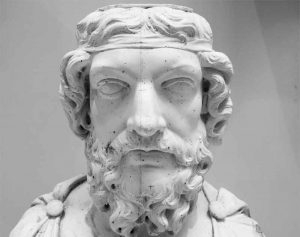Hesiod and the Didactic Poetry

Thus, if the heroic is the epic of war and adventure, the didactic is the epic of peace and civilization.
It is the projection of a society that abhors war and chooses peaceful life as its ideal.
War achievements are replaced by the achievements of daily life and toil. The name of Homer is connected with the heroic epic, while the name of Hesiod is connected with the didactic one.
Theogony
It refers to the genealogy of the gods and the creation of the world. The poem presents the myth of succession (Uranus – Cronus – Zeus), the genesis of cosmic elements, Chaos, Tartarus, Erevos (darkness), Gaia, Nyx, Aether, Pontus, the birth of the Titans and the Titanomachy.
The triune principle dominates: Chaos, Earth and Eros, which make up the cosmological triangle, in contrast to the Theogonic (Uranus-Saturn-Zeus), while the great figure of Zeus is the main axis.
Next to the balanced power of Zeus stands the Dike (justice), daughter of Zeus and Themis, sister of Peace and Eunomia. Zeus inaugurates order in the face of the disorder represented by the dark forces of the past, which are eventually overthrown by him.
Works and Days
Works and Days [1], it is the most famous didactic epic poem and is based on the quarrel between the poet and his brother due to a legal dispute over the paternal heritage. The main themes of the works are Iris (= discord) with its two aspects, good and bad, law and work, a theme which also dictates the title of the epic.
The poem begins with the invocation of the Muses (to inspire him) and the hymn to the supreme god, Zeus, then, in the first part, the theoretical one, the poet addresses his brother, Persias , with mythical narratives (myths of Prometheus, Pandora, of the five generations) tries to answer questions about the structure of human society, moral obligations, the origin of evil in the world.
The virtues that are useful in the struggle of life (economy, foresight, moderation, sociability) are especially emphasized.
In the second part of the epic, the minutes are given religious and moral advice on human relations between relatives, friends and neighbours, as well as advice on agriculture, shipping and trade
Aspis
Describes the struggle of Heracles against Cygnus, son of Ares, a robber who prevented the passage of the followers of Apollo to Delphi. Hesiod in the description of the shield of Heracles imitated Homer’s Iliad, shield of Achilles). The difference, however, in the two descriptions is obvious; in the shield of the Homeric hero the images show the diversity of life, while in the shield of Heracles they reveal the horror of war and the demons of destruction, thus projecting, on the contrary, the peaceful side of life. .
Women’s Catalog
The work was a continuation of Theogony and a comparison of heroines in pairs. It contained a list of women who gave birth to heroes from gods. Some other poems are attributed to Hesiod, such as Megalai Hoiai, Melambodia, Eis Adou Katavasis (Theseus and Peirithos), Chironos Hypothike, Earth period, Astronomy etc. Only excerpts have been saved.
Effect
Hesiod’s religious and especially moral conceptions of social justice profoundly influenced the prosocratic philosophers, especially Heraclitus, Parmenides and Empedocles, as well as the lyric poets of the archaic era, who, influenced by the new politico-social conditions, would promote the individual and its values.
The personalization of Hesiodian poetry has a predominant effect on Archilochus. It was especially appreciated in Hellenistic times (Callimachus, Apollonius). His works had a great influence on bucolic poetry (Theocritus) and Roman literature, “Transformations” of Ovid and the Agricultural and election of Virgil.
